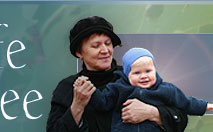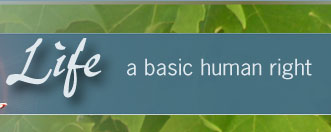 |
|
 |
|
| 2004 |
Jan |
 Last
Acts Partnership is awarded
$2.25 million from RWJF as technical assistance
for the Last Acts program (4/2004-3/2007). On
1/7/04, Karen Kaplan and Tom
Koutsoumpas, Jr. (VITAS Healthcare; Partnership
for Caring) host an event
at the National Press Club to announce the launch
of Last Acts Partnership. Last
Acts Partnership is awarded
$2.25 million from RWJF as technical assistance
for the Last Acts program (4/2004-3/2007). On
1/7/04, Karen Kaplan and Tom
Koutsoumpas, Jr. (VITAS Healthcare; Partnership
for Caring) host an event
at the National Press Club to announce the launch
of Last Acts Partnership.
Under the new name, the group emphasized
lobbying efforts for national and state legislation.
As of July, 2004, they were encouraging their members
to work for passage of the following bills:
- S.
1629 - Children's Compassionate Care Act
(sponsors)
- S.
538 - Lifespan Respite Care Act (sponsors)
introduced by Hillary Clinton (D-NY); passed; now
goes to HR 1083
- H.R.
3127 - Pediatric Palliative Care Act
(sponsors)
- H.R.
2883 - Living Well with Fatal Chronic Illness
Act (sponsors)
- H.R.
1863 - National Pain Care Policy Act
(sponsors)
- H.R.
1083 - Lifespan Respite Care Act
(sponsors)
- S.
2545 - Advance Directives Improvement and Education
Act of 2004 (S. 2545) (sponsors)
Introduced by Senators Rockefeller and Nelson.
- S.RES.
391 - S. Resolution 391, which would designate
the second week of December as Conversations Before
the Crisis Week Introduced by Sen. Nelson
By the end of 2004, Karen Orloff Kaplan
would leave Last Acts Partnership to join Wye River
Group on Healthcare. Finally, Last Acts Partnership
closed, but one of its projects moved to a new location.
[Next: September, 2004, Rallying Points continues at NHPCO] |
| 2004 |
Feb |
LAST
MILES OF THE WAY HOME: A National Conference
to Improve End-of-Life Care for African-Americans held
in Atlanta starting February 26. This was the national
conference envisioned by Marian Gray Secundy's roundtable
in June, 2000.
(The opening luncheon
featured a keynote address by Faith in Action spokesperson
Della Reese). |
| 2004 |
Feb |
Richard Payne, MD, is
named director
of Duke University's Institute on Care at the End
of Life (Durham, NC). Duke Divinity School's dean
said Dr. Payne "will continue the institute's focus on
faith communities and on diverse populations, especially
African-Americans, while also extending its reach in teaching,
research and outreach." |
| 2004 |
Mar |
Pope John
Paul II addresses the International Congress on
Life-Sustaining Treatments and Vegetative State, and
denounces the practice of withholding hydration
and nutrition (for patients whose organs have
not shut down, and who can assimilate food and water):
"I should like particularly
to underline how the administration of water and food,
even when provided by artificial means, always represents
a natural means of preserving life, not a medical act. Its use, furthermore, should
be considered, in principle, ordinary and proportionate, and as such morally obligatory
. . .
Death by starvation or dehydration is, in fact, the
only possible outcome as a result of their [nutrition
and hydration] withdrawal. In this sense it ends up
becoming, if done knowingly and willingly, true and
proper euthanasia by omission." --Pope John Paul II,
3/20/2004
|
| 2004 |
Apr |
The National
Consensus Project (NCP), comprised of
- American Academy of Hospice and
Palliative Medicine (AAHPM)
- Center to Advance Palliative
Care (CAPC)
- Hospice and Palliative Nurses
Association (HPNA)
- Last Acts Partnership
- National Hospice and Palliative
Care Organization (NHPCO),
announces
in a press release the publication of Clinical
Practice Guidelines for Quality Palliative Care.
These guidelines are to be the standard for palliative
care services across the country. The guidelines
acknowledge:
| Funding from: |
|
Supported by: |
- American Academy of Hospice and Palliative
Medicine
- Arthur Vining Davis
- Center to Advance Palliative Care
- The Charitable Leadership Foundation
- Hospice of the Western Reserve
- Hospice and Palliative Care Nurses Association
- Last Acts Partnership
- Mayday Fund
- National Hospice and Palliative Care Organization
- Purdue Pharma Fund
- The Robert Wood Johnson Foundation
|
|
- Beth Israel Medical Center, New York, NY
- City of Hope National Medical Center
- Harvard Medical School Center for Palliative
Care
- The Hospice of the Florida Suncoast
- Massachusetts General Hospital
- Hertzberg Palliative Care Institute, Mount
Sinai School of Medicine
- National Hospice Work Group
- National Institutes of Health, Warren Grant
Magnuson Clinical Center
- New York University, Steinhardt School of
Education, Division of Nursing
- Palliative Care Center and Hospice of the
North Shore
- San Diego Hospice and Palliative Care
- University of Pittsburgh School of Medicine
- Vitas HealthCare
|
In an effort to define palliative care,
the manual provides a diagram similar to the following
diagram. The guidelines position palliative care
opposite lifesaving therapy, as shown here:
The guidelines note that the population served encompasses all persons with life-threatening or debilitating illness (in other words, not only patients who are "imminently
dying," or even "terminally ill.") See for example
a sample discussion of ethical
guidelines for palliative care (page 36 of the Guidelines).
|
| 2004 |
Jun |
 End
of Life Choices and Compassion in Dying begin merger
to form Compassion
& Choices. End
of Life Choices and Compassion in Dying begin merger
to form Compassion
& Choices. |
| 2004 |
Sep |
  RWJF
grants National Hospice and Palliative Care
Organization (NHPCO)
$2.3 million to continue Rallying Points. Kathy
Brandt is named Project Director. Brandt had been Director
of Operations at Hospice of Florida Suncoast. Under
Karen Kaplan's direction, Rallying Points had featured
three regional resource centers: Missoula; Midwest Bioethics;
Hospice of the Florida Suncoast. Kathy Brandt was director
of the Eastern resource center, which was Hospice of
the Florida Suncoast. RWJF
grants National Hospice and Palliative Care
Organization (NHPCO)
$2.3 million to continue Rallying Points. Kathy
Brandt is named Project Director. Brandt had been Director
of Operations at Hospice of Florida Suncoast. Under
Karen Kaplan's direction, Rallying Points had featured
three regional resource centers: Missoula; Midwest Bioethics;
Hospice of the Florida Suncoast. Kathy Brandt was director
of the Eastern resource center, which was Hospice of
the Florida Suncoast.
Rallying Points then, and now, featured
lectures from attorney William Colby, who represented
the Cruzans in arguing for the removal of Nancy Cruzan's
feeding tube.
A press
release from NHPCO, posted simultaneously at the Rallying Points web site, suggests
that the mission continued to be activism at the state
and local level:
"The grant will provide support
to the more than 350 community and state coalitions
working to improve end-of-life care at the local level
in health care systems, hospices and palliative care
programs, physician offices, the workplace, faith
communities, local government, and other community-based
organizations. Additionally, it will provide support
for consumer engagement and community outreach efforts,
develop new resources, build a comprehensive consumer
Web site and information center, and offer a consumer
services program."
[Next: Rallying Points changes name to "Caring
Connections," below.] |
| 2004 |
Nov |
 Rallying Points' Katherine Brandt moves from Hospice of the Florida Suncoast, to
NHPCO as Vice President, Professional Leadership and
Consumer and Caregiver Services. Rallying Points' Katherine Brandt moves from Hospice of the Florida Suncoast, to
NHPCO as Vice President, Professional Leadership and
Consumer and Caregiver Services.
At NHPCO, Rallying Points changes its
name to Caring Connections, "a nationwide consumer
outreach initiative." Caring Connections has two web
sites: one for coalitions,
and one for consumers that is billed as a "one-stop-shop" for EOL information.
The consumer site calls on the public to "tell
your story to your congressperson," and provides
contact information.
[Next: Another $4.9 million to Rallying Points, dba
"Caring
Connections."] |
| 2004 |
Dec |
NIH State-of-the-Science
Conference on Improving End-of-Life Care, Dec 6-8.
The purpose is to chart the course of end-of-life research
funding. Sponsored by NINR and OMAR of NIH; co-sponsored
by CDC, CMMS, NCI, NIMH, and National Institute on Aging.
Funded by AHRQ. Preliminary studies done by RAND
and its partner Veterans Administration Greater Los
Angeles Healthcare System.
Participants included RWJF/PDIA project
directors such as Betty Ferrell, Joan Teno, LaVera
Crawley, Sean Morrison, Charles von Gunten, James Tulsky,
and Harvey Chochinov.
The conference produced a consensus statement.
Sample quotations from the draft
statement:
- "Respect for choice (patient or proxy), especially
at the end of life, is a central value. However,
patient and provider expectations and/or the desire
for resource-intensive therapies with a small chance
of benefit may clash with societal
priorities."
- "For example, in the case of dementia, providers
often do not even recognize
dementia as a terminal illness."
- "Encouragement to initiate advance directives (i.e.,
legal documents ...) alone have not been shown to
improve outcomes in non-dementia patients; however,
the reasons for this are not well known. Little evidence
of the effect of advance directives on care of people
with impaired decision-making ability was presented.
Advanced-care planning—a process for preparing
for the end of life, including discussion of death—is
different from advanced directives and needs further
study to examine its effectiveness.
- Spirituality is consistently defined as a critical
domain in end-of-life care; research on interventions
to improve spiritual well-being is very limited. Preliminary
evidence of a specific intervention—dignity
therapy—shows positive outcomes for both
the patient and family in terms of satisfaction and
heightened sense of dignity, purpose, meaning, and
grief management."
- "Infrastructure: Create a network of end-of-life
investigators and well-defined cohorts of patients
to facilitate coordinated interdisciplinary, multisite
studies. This should include establishing new networks
of end-of-life investigators, as well as expanding
existing networks (such as the National Clinical Trials
Cooperative Groups) so they have a critical mass of
end-of-life investigators and appropriate study populations. These networks should enhance
training of a new generation of interdisciplinary
scientists (through funding mechanisms such as K-awards,
T32s, and R25s)."
|
| 2005 |
July |
 Caring
Connections (formerly Rallying Points) receives $4.9 million from Robert Wood Johnson Foundation (9/2005
- 8/2007). Project Director is Kathy Brandt. Caring
Connections (formerly Rallying Points) receives $4.9 million from Robert Wood Johnson Foundation (9/2005
- 8/2007). Project Director is Kathy Brandt. |
| |
|
[back] [bibliography]
Updated
on
September 22, 2009 7:17
Unpublished work © Copyright 2004-2009 I. Whitlock. |
|
|
 |







